A young Japanese-American couple fall in love in a WWII relocation center as an African-American jazz musician imprisoned in a Nazi death camp falls for a Jewish inmate in Letters To Eve, an ambitious new musical by Daniel Sugimoto whose reach ultimately exceeds its grasp despite some effective moments, performances, and songs.
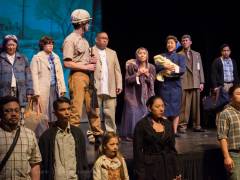 Newspaper headlines from December 1941 announce the Japanese attack on Pearl Harbor and the forced evacuation from the West Coast of both Japanese citizens and their America-born family members as musical underscoring makes one thing unfortunately clear.
Newspaper headlines from December 1941 announce the Japanese attack on Pearl Harbor and the forced evacuation from the West Coast of both Japanese citizens and their America-born family members as musical underscoring makes one thing unfortunately clear.
Sugimoto’s talent as a composer will not be done justice by a tinny sound system woefully insufficient for a musical as epic as the dual-plotted Letters To Eve sets out to be.
Plot A centers on 20ish nerd-next-door Ray (Melvin Biteng), smitten by pert, pretty fellow internee Eve (Andrea Somera) but so shy about revealing his feelings that he must ask his best bud Maki (Arvin Lee) to play Cyrano to his Christian in the delightful “Lonely Heart.” (“I’m supposed to ask you about your day,” Ray tells Eve, parroting Maki’s words with delicious ineptitude.)
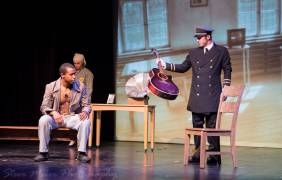 Plot B takes us to Nazi Germany where a young black entertainer named Archie Kyle (John F. Thomas) finds himself commanded by Officer Dierk (Austin Shchumacher) to prove his identity in song, an assignment the prisoner aces vocally in “Lonely Heart” (despite some obviously fake guitar-strumming), after which, in a German accent so thick only a handful of comprehensible words emerge, Dierk barks out orders for guitar lessons, a demand Archie agrees to on condition that he be moved to the camp’s “special barracks,” presumably to be closer to the girl of his dreams.
Plot B takes us to Nazi Germany where a young black entertainer named Archie Kyle (John F. Thomas) finds himself commanded by Officer Dierk (Austin Shchumacher) to prove his identity in song, an assignment the prisoner aces vocally in “Lonely Heart” (despite some obviously fake guitar-strumming), after which, in a German accent so thick only a handful of comprehensible words emerge, Dierk barks out orders for guitar lessons, a demand Archie agrees to on condition that he be moved to the camp’s “special barracks,” presumably to be closer to the girl of his dreams.
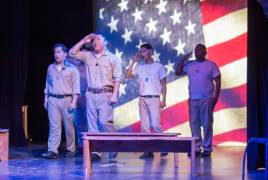 Plot A then has interned Japanese-Americans being forced to choose between loyalty oaths or prison as the younger males among them are offered the opportunity to serve their country as members of the “Go For Broke” 442nd Infantry Regiment.
Plot A then has interned Japanese-Americans being forced to choose between loyalty oaths or prison as the younger males among them are offered the opportunity to serve their country as members of the “Go For Broke” 442nd Infantry Regiment.
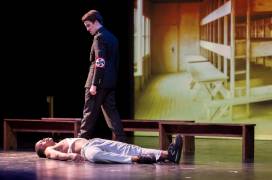 Meanwhile, Plot B has Archie doing his darnedest to make camp life more bearable for Eden (Talya M. Sindel), the Jewish girl of his dreams, who has, unbeknownst to him, also caught the eye of officer-in-command Volker (Sugimoto), a man whose sexual designs on her are matched in evil by the medical experimentation he intends for Archie.
Meanwhile, Plot B has Archie doing his darnedest to make camp life more bearable for Eden (Talya M. Sindel), the Jewish girl of his dreams, who has, unbeknownst to him, also caught the eye of officer-in-command Volker (Sugimoto), a man whose sexual designs on her are matched in evil by the medical experimentation he intends for Archie.
Sugimoto takes as his inspiration some relatively unknown historical facts (a number of African-Americans were indeed imprisoned in Nazi concentration camps, and a squadron of Japanese-American soldiers were indeed among the first Allied troops to release prisoners from Dachau) and weaves them together as musical theater, ultimately earning higher marks for intentions than for results.
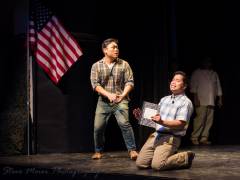 Letters To Eve works best when focusing on subject matter closest to its creator’s heart. (Sugimoto dedicates the musical to his grandmother Midori.) Scenes taking place in California and eventually on the battlefield have a more authentic feel than death camp scenes straight out of a WWII-era Hollywood anti-Nazi melodrama.
Letters To Eve works best when focusing on subject matter closest to its creator’s heart. (Sugimoto dedicates the musical to his grandmother Midori.) Scenes taking place in California and eventually on the battlefield have a more authentic feel than death camp scenes straight out of a WWII-era Hollywood anti-Nazi melodrama.
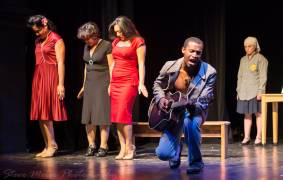 Sugimoto’s eclectic mix of songs reveal considerable talent, from the stirring full-cast “One By One” to the bluesy “Lonely Heart” with its Andrews Sisters backup harmonies to the rockabilly charmer “Wartime Blues.”
Sugimoto’s eclectic mix of songs reveal considerable talent, from the stirring full-cast “One By One” to the bluesy “Lonely Heart” with its Andrews Sisters backup harmonies to the rockabilly charmer “Wartime Blues.”
Less successful is spoken dialog in rhyming-couplets that may have worked in Moliere’s time but seem awkwardly out of place in a contemporary musical.
Director Julia Lisa balances intimate moments with grander ones. Segues between scenes are smoothly executed, slides projected on the rear wall of Santa Monica’s Miles Memorial Playhouse making it clear where we are at any given time.
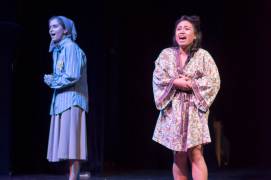 Biteng (dorkishly charming), Somera (lovely and powerful), and Lee (adorably bearish) shine brightly both as actors and as vocalists. Thomas and Sindel have tougher assignments as the most star-crossed of lovers, but each has his or her effective moments.
Biteng (dorkishly charming), Somera (lovely and powerful), and Lee (adorably bearish) shine brightly both as actors and as vocalists. Thomas and Sindel have tougher assignments as the most star-crossed of lovers, but each has his or her effective moments.
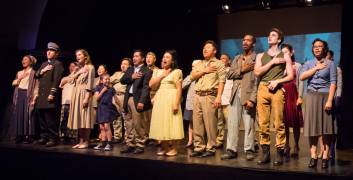 Featured players Shervin Biteng, John Bougher, Linda Gohata, Marcel Licera, Derek Mateo, Saki Miata, Coppélia Morris, Schumacher, Sugimoto, and Karen Takahashi and ensemble members Felicity Morris, Abigail Somera, Hannah Sturgeon, Cindy Tsai, and Elise Zell create multiple characters, provide local color, and despite considerable disparity in vocal talents, when joining voices under Sugimoto’s musical direction they give the audience some idea of the potential for the composer’s melodies to soar.
Featured players Shervin Biteng, John Bougher, Linda Gohata, Marcel Licera, Derek Mateo, Saki Miata, Coppélia Morris, Schumacher, Sugimoto, and Karen Takahashi and ensemble members Felicity Morris, Abigail Somera, Hannah Sturgeon, Cindy Tsai, and Elise Zell create multiple characters, provide local color, and despite considerable disparity in vocal talents, when joining voices under Sugimoto’s musical direction they give the audience some idea of the potential for the composer’s melodies to soar.
Physically challenging Army training and battle scenes add excitement, and there’s a lovely fantasy waltz to interrupt Archie’s daily horrors.
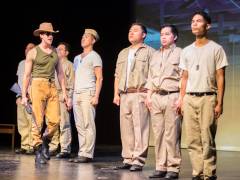 The lack of a more detailed scenic design than slides and movable set pieces ends up less problematic than a live band’s absence thanks to Lisa’s authentic-looking costumes, Takahashi’s equally nostalgic ‘40s hair designs, and Jeffrey Lisa’s period props, competently lit by Zachary Johnson Dulop, though why the Germans didn’t at least give Archie a shirt to wear under his tattered blazer is anyone’s guess. Sound designer Schumacher is ill served by an inadequate sound system.
The lack of a more detailed scenic design than slides and movable set pieces ends up less problematic than a live band’s absence thanks to Lisa’s authentic-looking costumes, Takahashi’s equally nostalgic ‘40s hair designs, and Jeffrey Lisa’s period props, competently lit by Zachary Johnson Dulop, though why the Germans didn’t at least give Archie a shirt to wear under his tattered blazer is anyone’s guess. Sound designer Schumacher is ill served by an inadequate sound system.
Abigail Somera is dance captain. Emi Kamemoto and Juliet Lanclot are dramaturgs.
Ultimately, the merging of what feels like two separate musicals into one proves more awkward than inspired, and at two-and-a-half hours not including intermission, Letters To Eve could use a trim. Some rethinking and rewriting might also be in order.
The Miles Memorial Playhouse, 1130 Lincoln Boulevard, Santa Monica.
www.letterstoeve.com
–Steven Stanley
May 27, 2017
Photos: Steve Meier Photography
Tags: Daniel Sugimoto, Los Angeles Theater Review, Miles Memorial Playhouse



 Since 2007, Steven Stanley's StageSceneLA.com has spotlighted the best in Southern California theater via reviews, interviews, and its annual StageSceneLA Scenies.
Since 2007, Steven Stanley's StageSceneLA.com has spotlighted the best in Southern California theater via reviews, interviews, and its annual StageSceneLA Scenies.







 COPYRIGHT 2024 STEVEN STANLEY :: DESIGN BY
COPYRIGHT 2024 STEVEN STANLEY :: DESIGN BY